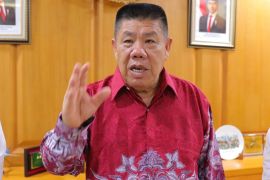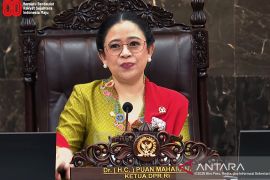"The basis of growth in quarter one was already higher than last year and the potential for higher growth in the next quarter was bigger," Finance Minister Bambang Brodjonegoro said.Jakarta (ANTARA News) - Despite witnessing low performance in the first quarter, the government is optimistic that the economic growth in the second quarter of this year will be higher.
Moreover, the growth in the first quarter of 2016, recorded at 4.92 percent, was higher than in the same period last year, when it was only 4.71 percent.
Finance Minister Bambang Brodjonegoro has expressed optimism about the expected economic growth in the second quarter, saying it would be better, although the countrys economy grew by only 4.92 percent in the first quarter.
Bambang said the economic growth target could still be achieved because growth in the first quarter was better than during the same period last year.
"The basis of growth in quarter one was already higher than last year and the potential for higher growth in the next quarter was bigger," he said when contacted to comment on the issue.
Bambang explained that one of the causes of the lower-than-expected growth in the first quarter was weaker household consumption, owing to lower public demand and purchasing power of the people.
Therefore, the National Development Planning Minister and Head of the National Development Planning Board (Bappenas), Sofyan Djalil, said the government has not yet revised its economic growth target for 2016, set at 5.3 percent.
He said he would wait for the draft revised 2016 state budget (APBNP) before deciding whether or not to revise this target.
"We have not yet decided to revise it," Sofyan stated after he spoke at a seminar at the 41th Session of the Islamic Development Bank (IDB) in Jakarta on Tuesday.
He said he would first look at the APBNP 2016. "Only after that we can see whether we need to revise it or not," he said.
Earlier, Bank Indonesia (BI), the Indonesian central bank, said the Indonesian economic growth target at 5.3 percent for 2016 could still be achieved if the budget is expeditiously disbursed.
"In the first quarter, the disbursement of the government budget is still low. This should be expedited. Hopefully, in the third and fourth quarter of the year, the economy will grow better, reaching the 5.2 - 5.3 percent level. It is something that can still be achieved. A 5.6 percent level is still too early to predict, however," Senior Deputy Governor of BI Mirza Adityaswara said in Depok, West Java, on Saturday.
Mirza said all ministries and regional governments should expedite budget disbursement so that the growth in the second quarter is better than the first quarter when it was only 4.92 percent.
The same optimism was also expressed by HSBC bank. It has revised up its prediction of the countrys economic growth this year from 4.7 percent to 5 percent despite slowdown in the first three months of the year.
"HSBC is optimistic about the countrys economic growth this year. The key factor is increase in inflow of foreign investment resulting in a strong growth in to successive quarters," HSBC economist for ASEAN, Su Sian Lim , said here on Thursday (May 12).
Su Sian Lim was speaking at HSBC Economic Outlook 2016 titled "ASEAN Economic Community: Indonesia to Punch Above Its Weight".
He said the slowdown in 2015 and early 2016 was caused by commodity price fall and weak exports on slump in the global market.
"However, Indonesian economy has shown signs of recovery. For that purpose it is necessary to continue to the push for reform to attract more investment, improve productivity and encourage new sources of growth," he said.
In the meantime, Vice President Jusuf Kalla said the government is optimistic that the targeted economic growth would be achieved by opening more economic opportunities and increasing the budget.
"We will try to increase the budget in the next quarter and also to open more economic opportunities. The market is indeed weakening now," he noted.
The Central Bureau of Statistics (BPS) has reported that household consumption slowed down in the first quarter, resulting in the economy growing only 4.92 percent, down from usual 5 percent.
It also noted that all groups of businesses were seeing weakened performance, except transportation and communication, as well as the restaurant and hotel sectors.
However, household consumption is still the biggest contributor to the Gross Domestic Product, its share recorded at 56.86 percent in the first quarter, followed by fixed capital formation (PMTB) at 33.16 percent and exports at 18.78 percent.
In view of consumption, Finance Minister Bambang Brodjonegoro said one of the efforts to increase economic performance would be to boost public buying power so that the household consumption sector contributes maximally to growth.
"The slow growth in consumption has occurred because of the impact of income while the public still holds off greater consumption. So bigger government spending is needed and non-taxable income level needs to be raised by 50 percent," he said.
According to the Central Bureau of Statistics, Indonesias economy grew by 4.92 percent in the first quarter this year, which is below the governments target of 5.3 percent.
Suryamin, the agencys head, believes that the projected growth of 5.3 percent by the end of the year can still be achieved.
"We think the opportunity is still open as the start has been good at 4.49 percent. This is still better than 4.73 percent recorded in the same period last year," he pointed out.
He explained that the economy can continue to grow at a better rate in the next period as the construction and agricultural sectors can still be significant contributors to the nations economy.
Suryamin said his office was optimistic that the nations economy would continue to grow in line with its potential, on the condition that the government can capitalize on the existing momentum by formulating conducive policies and strategies to boost the real and service sectors.(*)
Reporter: Andi Abdussalam
Editor: Heru Purwanto
Copyright © ANTARA 2016











